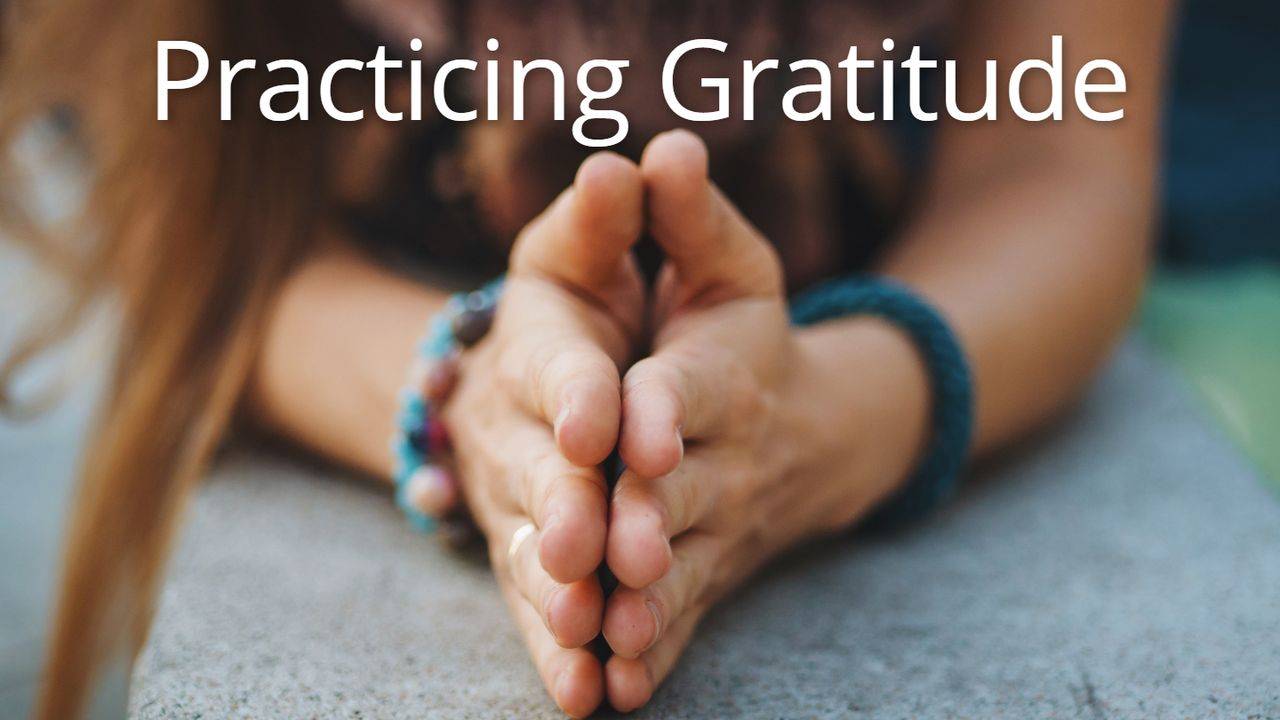Gratitude is a powerful force that can transform our lives in countless ways. At its heart, it is a deep and abiding sense of thankfulness for all the gifts and blessings we receive each day.
While gratitude is often associated with the Thanksgiving holiday or other festive occasions, it is actually a spiritual practice that has been embraced by many different cultures and religions throughout history.
Definition of Gratitude
Gratitude can be defined as an emotion or attitude that arises when we recognize the good things in our lives, both big and small. When we feel grateful, we are acknowledging the kindness of others, the beauty of nature, or the simple pleasures that make life worth living.
Gratitude can take many forms – it might involve expressing thanks to God or a higher power, thanking a friend or loved one for their support, or simply pausing to savour a beautiful sunset.
At its core, gratitude is about cultivating an awareness of all the goodness in our lives and learning to appreciate it fully. It is not simply about saying “thank you” in response to something nice – it’s about developing an ongoing practice of gratitude that helps us stay connected to what matters most.
Importance of Gratitude in Spiritual Growth
Gratitude is an essential component of spiritual growth because it helps us develop a deeper sense of connection and purpose in life. When we cultivate gratitude regularly, we become more aware of how interconnected we are with other people, with nature, and with the divine. We start to see life as a gift rather than an endless series of obligations or challenges.
Moreover, gratitude has been shown to have numerous psychological benefits as well. Studies have found that people who regularly practice gratitude tend to be happier overall than those who don’t – they report higher levels of positive emotions like joy and contentment as well as lower levels of negative emotions like anxiety and depression.
The purpose of this article is to explore the many ways in which gratitude can benefit our spiritual lives. We will delve into the science behind gratitude and its effects on our mental, emotional, and physical wellbeing.
We will also discuss practical strategies for incorporating gratitude into our daily routines and spiritual practices. Overall, by the end of this article, readers will have a deeper understanding of why gratitude is such a powerful tool for spiritual growth – and they will be equipped with concrete steps they can take to cultivate more thankfulness in their own lives.
Gratitude as a Spiritual Practice
Gratitude as a form of prayer
Prayer is an important spiritual practice in many religions, and expressing gratitude is often a vital part of prayer. When we give thanks for the blessings in our lives, we acknowledge that they come from a higher power and express our appreciation for them. In doing so, we strengthen our connection with that power and deepen our faith.
In prayer, gratitude can take many forms. Some people choose to offer thanks for specific things that have happened to them, while others may simply express their gratitude for the beauty of the world around them.
Regardless of how it is expressed, the act of giving thanks can be transformative. It can help us shift our focus away from what we lack and towards what we have been given.
Gratitude as an expression of faith and trust in a higher power
When we express gratitude, we demonstrate our faith and trust in a higher power. We acknowledge that there are forces at work beyond our control, and that we are grateful for their presence in our lives. This expression of faith can be incredibly empowering, giving us strength to face challenges with confidence and resilience.
Gratitude also helps us build trust in the universe or God’s plan for us. When things are going well, it’s easy to feel like everything is under control.
But when life gets difficult, it can be hard to maintain that sense of trust and faith. By practicing gratitude regularly – even during challenging times – we remind ourselves that there is still good in the world and give ourselves permission to let go of fear or doubt.
Gratitude as a way to cultivate inner peace and contentment
At its core, gratitude is about cultivating inner peace and contentment by focusing on what we have rather than what we lack. When we practice gratitude regularly, we train our minds to seek out the positive aspects of our lives and to appreciate them fully. This shift in focus can have profound effects on our mental health and well-being.
Studies have shown that people who practice gratitude regularly experience greater levels of happiness, lower levels of stress and anxiety, and better sleep quality than those who don’t. By training ourselves to see the good in our lives, we create a sense of abundance and fulfilment that can help us weather any storm.
Gratitude is a powerful spiritual practice that has the potential to transform our lives. By expressing thanks for the blessings in our lives, we deepen our faith, cultivate inner peace, and find joy even in difficult times. Whether it’s through prayer or simple daily practices like keeping a gratitude journal or offering thanks before meals, there are countless ways to incorporate gratitude into your spiritual life.
So why not give it a try? Your heart – and your soul – will thank you.
The Benefits of Practicing Gratitude
Gratitude is not only a spiritual practice but also has immense benefits for our overall well-being. It has been scientifically proven that regularly practicing gratitude can lead to increased feelings of joy, happiness, and positivity.
When we focus on the good things in our lives, we begin to experience a sense of contentment and satisfaction that can transform our outlook on life. This positive mindset helps us approach challenges with greater resilience and optimism.
In addition to the emotional benefits, practicing gratitude also improves our relationships with others. When we express gratitude toward the people in our lives, it strengthens our connections with them and creates a deeper sense of trust and appreciation.
Our words of thanks can be simple but powerful reminders to those around us that they are valued and loved. Furthermore, research has shown that regularly practicing gratitude can reduce stress and anxiety levels in individuals.
By focusing on what we are grateful for instead of what is causing us stress or worry, we train our brains to shift from negative thinking patterns to more positive ones. This mental shift can help reduce the impact of stress on both our mind and body.
There are physical health benefits associated with practicing gratitude as well. Studies have found that people who practice gratitude regularly have improved sleep patterns, reduced symptoms of depression, lower blood pressure levels, and improved heart health.
Practicing gratitude is not only good for spiritual growth but also has numerous benefits for both our emotional well-being and physical health. By cultivating an attitude of thankfulness in daily life through practices such as journaling or expressing appreciation verbally or through acts of kindness towards others – we can experience these benefits firsthand while also deepening our spiritual journey.
The Connection Between Gratitude and Mindfulness
Mindfulness practices that promote gratitude
One of the most common ways to cultivate gratitude through mindfulness is the practice of mindful breathing. This practice involves taking deep breaths, focusing on the sensation of the air moving in and out of your body. As you inhale, you can think about bringing in positive energy and as you exhale, releasing negative energy.
During this process, you can also reflect on the things in your life that you are grateful for. Another way to cultivate mindfulness and gratitude is through meditation.
Meditation allows us to focus our awareness on the present moment, letting go of past and future worries. A popular type of meditation practice for cultivating gratitude involves sitting quietly and visualizing your blessings.
This visualization can include people who have helped us along our path or simple pleasures like a warm cup of coffee. Gratitude journaling is another mindfulness practice that promotes gratitude.
This practice involves writing down things we are grateful for each day, helping us focus our attention on positive aspects of life rather than negative ones. By taking time to focus on what we are grateful for, we become more attentive to all the good things in our lives.
How mindfulness helps us cultivate gratitude
Mindfulness helps us cultivate gratitude by training our minds to focus on what is good even amidst difficulty. When we are mindful, we become more aware of our thoughts and emotions, which allows us to step back from them and observe them without judgment or attachment. Through this process, we learn to let go of negative thoughts and emotions while focusing instead on positive ones.
Mindfulness also helps us develop a greater sense of connection with others around us by promoting empathy and compassion towards those experiencing challenging situations similar to ours or different from ours too.. When we are aware and appreciative of all that others have done for us in their own life, we are able to extend gratitude and kindness more easily. Through mindfulness, we can learn to be present in the moment, which is where all of life’s blessings reside.
As we shift our focus from what is lacking to what is abundant in our lives, gratitude becomes a natural extension of mindfulness. By cultivating an attitude of gratitude through practices like mindful breathing, meditation, and journaling, we can deepen our spiritual connection and experience greater peace and contentment in life.
Cultivating Gratitude in Daily Life
Simple practices for expressing gratitude daily
There are numerous ways to express gratitude in our daily lives. One of the simplest is to start each day by saying “thank you” for something specific.
It could be as simple as being grateful for a good night’s sleep or a warm cup of coffee. Another easy practice is keeping a gratitude journal, where you write down three things you’re grateful for each day.
This helps cultivate a mindset of gratitude and positivity. Walking in nature and appreciating the beauty around us is another way to express gratitude.
When we take time to notice the wonder of the natural world, we often feel a deep sense of thankfulness. We can also express gratitude by thanking people who have positively impacted our lives, whether it’s through a phone call, text message or handwritten note.
Ways to incorporate gratitude into spiritual practices
Many spiritual traditions incorporate practices that involve expressing gratitude. If you have a spiritual practice already, consider how you can add an element of thankfulness to it. For example, during meditation or prayer, take time to reflect on blessings in your life and express thanks for them.
Another way to incorporate gratitude into your spiritual practice is through acts of service or charity. When we give back to others who may be less fortunate than ourselves, it reminds us how blessed we are and helps cultivate feelings of appreciation.
The Power of Gratitude in Overcoming Challenges
How practicing gratitude can help us navigate difficult times with more grace and ease
When we face challenging times such as illness, loss or hardship in our lives, it can be easy to focus on what’s going wrong rather than what’s going right. But when we intentionally cultivate an attitude of thankfulness even during difficult times, it can help shift our perspective and bring us a sense of peace and resilience.
Practicing gratitude can also help us see challenges as opportunities for growth and learning. When we’re grateful for the lessons we’re learning or the people who are supporting us through tough times, it helps us reframe our experiences in a more positive light.
Examples from various spiritual traditions where people have used gratitude to overcome adversity
Many spiritual leaders throughout history have used gratitude as a tool for overcoming adversity. For example, Nelson Mandela, who was imprisoned for 27 years in South Africa, credited his practice of expressing gratitude with helping him maintain a positive outlook during his imprisonment.
Similarly, the Dalai Lama has spoken about how cultivating an attitude of thankfulness has helped him navigate some of the most difficult periods in Tibetan history. By focusing on what he had rather than what he lacked, he was able to find peace even during times of great loss and upheaval.
Conclusion
Practicing gratitude is a powerful way to enhance our spiritual growth. By cultivating an attitude of thankfulness in our daily lives and incorporating it into our spiritual practices, we can experience numerous benefits such as improved relationships, reduced stress and anxiety and enhanced physical health.
Moreover, when we face challenging situations in life, practicing gratitude can help us navigate them with more grace and ease by shifting our focus to what’s going right rather than what’s going wrong. So let’s make expressing gratitude a habit in our lives – it won’t only benefit ourselves but also those around us!
20 quotes from notable individuals on the topic of spiritual gratitude:
- “Gratitude is the fairest blossom which springs from the soul.” – Henry Ward Beecher
- “Gratitude is not only the greatest of virtues, but the parent of all others.” – Cicero
- “Gratitude is the sign of noble souls.” – Aesop
- “Gratitude is the inward feeling of kindness received. Thankfulness is the natural impulse to express that feeling. Thanksgiving is the following of that impulse.” – Henry Van Dyke
- “Gratitude is a duty which ought to be paid, but which none have a right to expect.” – Jean-Jacques Rousseau
- “Gratitude makes sense of our past, brings peace for today, and creates a vision for tomorrow.” – Melody Beattie
- “Gratitude is the healthiest of all human emotions. The more you express gratitude for what you have, the more likely you will have even more to express gratitude for.” – Zig Ziglar
- “Gratitude is a currency that we can mint for ourselves, and spend without fear of bankruptcy.” – Fred De Witt Van Amburgh
- “Gratitude is riches. Complaint is poverty.” – Doris Day
- “Gratitude is when memory is stored in the heart and not in the mind.” – Lionel Hampton
- “Gratitude is the wine for the soul. Go on. Get drunk.” – Rumi
- “Gratitude is an antidote to negative emotions, a neutralizer of envy, hostility, worry, and irritation. It is savoring; it is not taking things for granted; it is present-oriented.” – Sonja Lyubomirsky
- “Gratitude bestows reverence, allowing us to encounter everyday epiphanies, those transcendent moments of awe that change forever how we experience life and the world.” – John Milton
- “Gratitude turns what we have into enough.” – Anonymous
- “Gratitude unlocks the fullness of life. It turns what we have into enough, and more. It turns denial into acceptance, chaos to order, confusion to clarity. It can turn a meal into a feast, a house into a home, a stranger into a friend.” – Melody Beattie
- “Gratitude is the sweetest thing in a seeker’s life – in all human life. If there is gratitude in your heart, then there will be tremendous sweetness in your eyes.” – Sri Chinmoy
- “Gratitude is a powerful catalyst for happiness. It’s the spark that lights a fire of joy in your soul.” – Amy Collette
- “Gratitude and attitude are not challenges; they are choices.” – Robert Braathe
- “Gratitude is the most exquisite form of courtesy.” – Jacques Maritain
- “Gratitude is the ability to experience life as a gift. It liberates us from the prison of self-preoccupation.” – John Ortberg
These quotes emphasize the transformative power of gratitude and its ability to bring joy, peace, and abundance into our lives.




























































